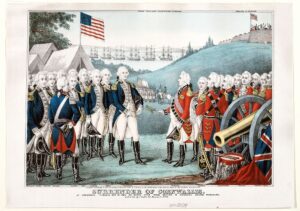NOTE FROM QUIN: Tuesday night, the third of six episodes of Ken Burns’ “The American Revolution” will air for two hours beginning at 8 p.m Eastern/7 p.m. Central Time. Judging from the first episode, it is well worth watching. As mentioned in the next article here on QuinHillyer.com and in a significant number of earlier columns of mine, one of my most fervent enthusiasms is for a rebirth of the right sort of civic engagement and pride in conjunction with next year’s 250th anniversary of the proclamation of the Declaration of Independence. I have long expressed a deep concern that the Semiquincentennial will not get the celebration it deserves. Burns’ series is a great opportunity to kick-start national attention where it belongs.

Surrender of Cornwallis, Smithsonian National Museum of African Art
More:
Original public domain image from Smithsonian
As it so happens, George Will wrote a nice column about it this week. Below is a beginning excerpt from it, along with a link to the original column. I hope you can get past the paywall in order to read the whole thing. Also, you may want to watch Will talk about the Revolution here at this link, from several months ago.
That said, here is the start of Will’s new column, the whole of which is at this link:
History’s gears are lubricated by gore. Witness America’s Revolutionary War, whose continuing reverberations have done more to improve the course of human events than any other event in history.
The war was fueled by crystalline ideas couched in elegant prose authored by members of the Colonial upper crust. But from 1777 on, most bleeding was done by “the poorest of the poor — jobless laborers and landless tenants, second and third sons without hope of an inheritance, debtors and British deserters, indentured servants and apprentices, felons hoping to win pardons.”
So says a new telling of America’s origin story, which is a tapestry of suffering, viciousness, selflessness and nobility. Beginning Sunday, in six two-hour episodes on PBS, “The American Revolution” will immerse viewers in an often bewildering, sometimes dismaying, but ultimately exhilarating documentary by Ken Burns, Sarah Botstein and David Schmidt.
It is a tutorial that teaches an appreciation of contingency: Things could have turned out very differently than they did. And of pre-modernity: George Washington’s army was threatened by Britain’s, but more so by smallpox, which killed 100,000 Americans, soldiers and others, during the seven war years…..
AND LATER IN THE COLUMN:
The fate of a continent was determined by mostly brief and small battles. The largest was the last, Yorktown, with nearly 20,000 American and French troops and 9,000 British engaged. Americans killed: 389. At Lexington: eight. Bunker Hill: 115. At Monmouth, the last major battle in the North: 362. (On the first day of the Battle of the Somme, July 1, 1916, almost 20,000 British soldiers were killed.)
In the 20th century, the fates of other continents were shaped by the material and moral resources our Revolution unleashed. A European general aiding the Patriots discovered the secret of America’s success, its inveterate individualism. To a European friend he wrote: “You say to your soldier, ‘Do this,’ and he does it; but [here] I am obliged to say, ‘This is the reason why you ought to do that,’ and then he does it.”…..
Again, the full column is here.
Tags: American Revolution, declaration, George Will, Ken Burns, PBS, Revolutionary War, semiquincentennial







